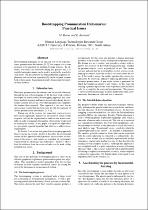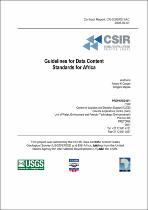JavaScript is disabled for your browser. Some features of this site may not work without it.
- ResearchSpace
- →
- Research Publications/Outputs
- →
- Conference Publications
- →
- View Item
Pronunciation dictionary development in resource-scarce environments
The deployment of speech technology systems in the developing world is often hampered by the lack of appropriate linguistic resources. A suitable pronunciation dictionary is one such resource that can be difficult to obtain for lesser-resourced languages. Researchers design a process for the development of pronunciation dictionaries in resource-scarce environments, and apply this to the development of pronunciation dictionaries for ten of the official languages of South Africa. The paper defines the semiautomated development and verification process in detail and discusses practicalities, outcomes and lessons learnt. It further analyse the accuracy of the developed dictionaries and demonstrate how the distribution of rules generated from the dictionaries provides insight into the inherent predictability of the languages studied.
Reference:
Davel, M and Martirosian, O. 2009. Pronunciation dictionary development in resource-scarce environments. 10th Annual Conference of the International Speech Communication Association (Interspeech 2009). Brighton, UK, 6-10 September, 2009. pp 2851-2854
Davel, M., & Martirosian, O. (2009). Pronunciation dictionary development in resource-scarce environments. International Speech Communication Association. http://hdl.handle.net/10204/3620
Davel, M, and O Martirosian. "Pronunciation dictionary development in resource-scarce environments." (2009): http://hdl.handle.net/10204/3620
Davel M, Martirosian O, Pronunciation dictionary development in resource-scarce environments; International Speech Communication Association; 2009. http://hdl.handle.net/10204/3620 .
Copyright: 2009 ISCA. This is the author's version of the work. It is posted here by permission of ISCA for your personal use. Not for redistribution. The definitive version was published in the Conference Proceedings of the 10th Annual Conference of the International Speech Communication Association (Interspeech 2009). Brighton, UK, 6-10 September 2009, pp 2851-2854
Sep 2009
Linguistic resources
Pronunciation dictionaries
Resource scarce languages
Dictionary verification protocol
Dictionary development protocol
Lwazi dictionaries
10th Annual Conference of the International Speech Communication Association
Interspeech 2009
Speech technology systems
Speech communication
Pronunciation dictionaries
Resource scarce languages
Dictionary verification protocol
Dictionary development protocol
Lwazi dictionaries
10th Annual Conference of the International Speech Communication Association
Interspeech 2009
Speech technology systems
Speech communication
Files in this item
Related Items
This item appears in the following Collection(s)
Related items
Showing items related by title, author, creator and subject.
-
Author: Davel, MH ; Barnard, E Date: Sep 2005 Bootstrapping techniques are an efficient way to develop electronic pronunciation dictionaries, but require fast system response to be practical for medium-to-large lexicons. In addition, user errors are inevitable during this process, and ... Read more
-
Author: Martirosian, O ; Davel, M Date: Nov 2007 The authors explore pattern recognition techniques for verifying the correctness of a pronunciation lexicon, focusing on techniques that require limited human interaction. They evaluate the British English Example Pronunciation (BEEP) dictionary ... Read more
-
Author: Cooper, Antony K ; Majeke, B Date: Apr 2008 This project was to develop guidelines for spatial data content standards in Africa. It focused on standards for data dictionaries, feature catalogues and classification, and also looked at standards for feature instances. The project ... Read more c b
Browse
-
All of ResearchSpace
-
This Collection
Legislation and compliance
General Enquiries
Tel: + 27 12 841 2911
Email: callcentre@csir.co.za
Physical Address
Meiring Naudé Road
Brummeria
Pretoria
South Africa
Postal Address
PO Box 395
Pretoria 0001
South Africa
Copyright © CSIR 2017. All Rights Reserved
Resources on this site are free to download and reuse according to associated licensing provision. Please read the terms and conditions of usage of each resource.








